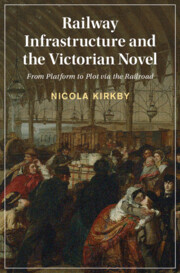Book contents
- Railway Infrastructure and the Victorian Novel
- Cambridge Studies in Nineteenth-Century Literature and Culture
- Railway Infrastructure and the Victorian Novel
- Copyright page
- Dedication
- Contents
- Figures
- Acknowledgements
- Introduction
- Chapter 1 Plotting a Novel Industrial Infrastructure
- Chapter 2 Writing between the Lines
- Chapter 3 Junctions
- Chapter 4 Rerouting Plot Lines in Daniel Deronda
- Chapter 5 Tunnel
- Chapter 6 The End of the Line
- Afterword
- Notes
- Bibliography
- Index
- Cambridge studies in nineteenth-century Literature and culture
Chapter 4 - Rerouting Plot Lines in Daniel Deronda
Published online by Cambridge University Press: 12 August 2025
- Railway Infrastructure and the Victorian Novel
- Cambridge Studies in Nineteenth-Century Literature and Culture
- Railway Infrastructure and the Victorian Novel
- Copyright page
- Dedication
- Contents
- Figures
- Acknowledgements
- Introduction
- Chapter 1 Plotting a Novel Industrial Infrastructure
- Chapter 2 Writing between the Lines
- Chapter 3 Junctions
- Chapter 4 Rerouting Plot Lines in Daniel Deronda
- Chapter 5 Tunnel
- Chapter 6 The End of the Line
- Afterword
- Notes
- Bibliography
- Index
- Cambridge studies in nineteenth-century Literature and culture
Summary
If literary form and railway infrastructure do not neatly align in nineteenth-century novels, then what is the significance of their close, inconsistent entanglement? Chapter 4 examines George Eliot’s 1876 novel Daniel Deronda, which takes full advantage of transport and communications infrastructure in its two mainline plots. Throughout Eliot associates markers of such systems – ‘dusty waiting rooms’, un-consulted Bradshaw’s railway guides, and telegrams relaying old news – with stasis and regression. Even where they advance the plot, they draw the narrative back in time. This chapter parallels communication infrastructure and novel form to interrogate how and why Eliot reconfigures established and well-traversed form in her final novel that pushes against the margins of literary realism. By offering an upset chronology and a refusal to drive plotlines to a conventional resolution, to what extent does Eliot reconceptualise systems rooted in timeliness and destination in Daniel Deronda?
Keywords
Information
- Type
- Chapter
- Information
- Railway Infrastructure and the Victorian NovelFrom Platform to Plot via the Railroad, pp. 101 - 118Publisher: Cambridge University PressPrint publication year: 2025
Accessibility standard: WCAG 2.1 AA
Why this information is here
This section outlines the accessibility features of this content - including support for screen readers, full keyboard navigation and high-contrast display options. This may not be relevant for you.Accessibility Information
Content Navigation
Allows you to navigate directly to chapters, sections, or non‐text items through a linked table of contents, reducing the need for extensive scrolling.
Provides an interactive index, letting you go straight to where a term or subject appears in the text without manual searching.
Reading Order & Textual Equivalents
You will encounter all content (including footnotes, captions, etc.) in a clear, sequential flow, making it easier to follow with assistive tools like screen readers.
You get concise descriptions (for images, charts, or media clips), ensuring you do not miss crucial information when visual or audio elements are not accessible.
You get more than just short alt text: you have comprehensive text equivalents, transcripts, captions, or audio descriptions for substantial non‐text content, which is especially helpful for complex visuals or multimedia.
Visual Accessibility
You will still understand key ideas or prompts without relying solely on colour, which is especially helpful if you have colour vision deficiencies.
Structural and Technical Features
You gain clarity from ARIA (Accessible Rich Internet Applications) roles and attributes, as they help assistive technologies interpret how each part of the content functions.
